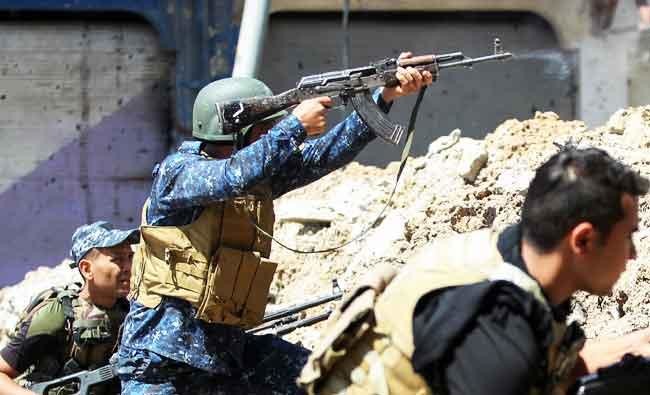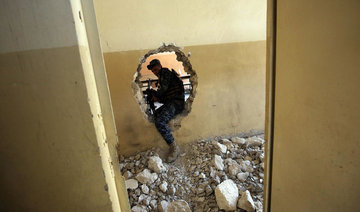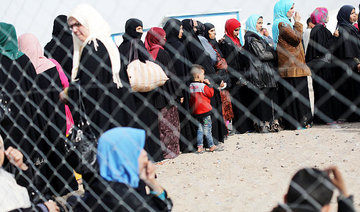BAGHDAD: Iraqi forces launched a new attack on Daesh in Mosul’s Old City on Sunday, military officials said, trying to break the stalemate in attempts to seize the militants’ last stronghold.
Mosul, Iraq’s second biggest city, was captured by the terrorists in 2014, but government forces have retaken much of it during a six-month operation.
The advance has hardly moved for more than a month, though, as the militants are holding out in the densely populated Old City in western Mosul, where tanks and heavy vehicles are not able to operate because of its narrow streets.
Iraq’s federal police moved forces 200 meters deeper into the Old City, getting closer to Al-Nuri Mosque, a statement said.
The mosque is highly symbolic because it was there that Daesh leader Abu Bakr Al-Baghdadi declared himself head of a self-proclaimed caliphate.
Troops have had the centuries-old mosque with its leaning minaret in their sights since last month.
A captain in the federal police said Sunday’s advance had started in the early morning with troops fighting the militants house to house.
“Daesh suicide motorcycles now are their favorite weapon inside the Old City,” he said, using a derogatory name for the terror group. “We have to watch every single house to avoid attackers on motorcycles packed with explosives.”
Iraqi government forces, backed by US advisers, artillery and air support, have cleared the east and half of western Mosul and are now focused on the Old City.
Iraqi forces make new push toward Mosul’s Old City
Iraqi forces make new push toward Mosul’s Old City

Syria monitor says alleged Assad loyalist ‘executed’ in public
BEIRUT: A Syria monitor said fighters linked to the Islamist-led transitional administration publicly executed a local official on Friday, accusing him of having been an informant under ousted strongman Bashar Assad.
The Britain-based Syrian Observatory for Human Rights said fighters affiliated with the new authorities executed Mazen Kneneh with a shot to the head in the street in the Damascus suburb of Dummar, describing him as “one of the best-known loyalists of the former regime.”
A Syria monitor said fighters linked to the Islamist-led transitional administration publicly executed a local official on Friday, accusing him of having been an informant under ousted strongman Bashar Assad. (AP/File)
Japan congratulates Lebanon on electing new President

- The ministry also said that Japan will continue to support Lebanon
TOKYO: The Government of Japan said it congratulates Lebanon on the election of the new President Joseph Aoun on January 9.
A statement by the Foreign Ministry said while Lebanon has been facing difficult situations such as a prolonged economic crisis and the exchange of attacks between Israel and Hezbollah, the election of a new President is an important step toward stability and development of the country.
“Japan once again strongly demands all parties concerned to fully implement the ceasefire agreement between Israel and Lebanon,” the statement added.
The ministry also said that Japan will continue to support Lebanon’s efforts on achieving social and economic stability in the country as well as stability in the Middle East region.
Lebanon PM to visit new Damascus ruler on Saturday

- Lebanon’s Prime Minister Najib Mikati will on Saturday make his first official trip to neighboring Syria since the fall of president Bashar Assad, his office told AFP
BERUIT: Lebanon’s Prime Minister Najib Mikati will on Saturday make his first official trip to neighboring Syria since the fall of president Bashar Assad, his office told AFP.
Mikati’s office said Friday the trip came at the invitation of the country’s new de facto leader Ahmed Al-Sharaa during a phone call last week.
Syria imposed new restrictions on the entry of Lebanese citizens last week, two security sources have told AFP, following what the Lebanese army said was a border skirmish with unnamed armed Syrians.
Lebanese nationals had previously been allowed into Syria without a visa, using just their passport or ID card.
Lebanon’s eastern border is porous and known for smuggling.
Lebanese Shiite group Hezbollah supported Assad with fighters during Syria’s civil war.
But the Iran-backed movement has been weakened after a war with Israel killed its long-time leader and Islamist-led rebels seized Damascus last month.
Lebanese lawmakers elected the country’s army chief Joseph Aoun as president on Thursday, ending a vacancy of more than two years that critics blamed on Hezbollah.
For three decades under the Assad clan, Syria was the dominant power in Lebanon after intervening in its 1975-1990 civil war.
Syria eventually withdrew its troops in 2005 under international pressure after the assassination of Lebanese ex-prime minister Rafic Hariri.
UN says 3 million Sudan children facing acute malnutrition

- Famine has already gripped five areas across Sudan, according to a report last month
- Sudan has endured 20 months of war between the army and the paramilitary forces
PORT SUDAN, Sudan: An estimated 3.2 million children under the age of five are expected to face acute malnutrition this year in war-torn Sudan, according to the United Nations Children’s Fund (UNICEF).
“Of this number, around 772,000 children are expected to suffer from severe acute malnutrition,” Eva Hinds, UNICEF Sudan’s Head of Advocacy and Communication, told AFP late on Thursday.
Famine has already gripped five areas across Sudan, according to a report last month by the Integrated Food Security Phase Classification (IPC), a UN-backed assessment.
Sudan has endured 20 months of war between the army and the paramilitary Rapid Support Forces (RSF), killing tens of thousands and, according to the United Nations, uprooting 12 million in the world’s largest displacement crisis.
Confirming to AFP that 3.2 million children are currently expected to face acute malnutrition, Hinds said “the number of severely malnourished children increased from an estimated 730,000 in 2024 to over 770,000 in 2025.”
The IPC expects famine to expand to five more parts of Sudan’s western Darfur region by May — a vast area that has seen some of the conflict’s worst violence. A further 17 areas in western and central Sudan are also at risk of famine, it said.
“Without immediate, unhindered humanitarian access facilitating a significant scale-up of a multisectoral response, malnutrition is likely to increase in these areas,” Hinds warned.
Sudan’s army-aligned government strongly rejected the IPC findings, while aid agencies complain that access is blocked by bureaucratic hurdles and ongoing violence.
In October, experts appointed by the United Nations Human Rights Council accused both sides of using “starvation tactics.”
On Tuesday the United States determined that the RSF had “committed genocide” and imposed sanctions on the paramilitary group’s leader.
Across the country, more than 24.6 million people — around half the population — face “high levels of acute food insecurity,” according to IPC, which said: “Only a ceasefire can reduce the risk of famine spreading further.”
Turkiye says France must take back its militants from Syria

- Ankara is threatening military action against Kurdish fighters in the northeast
- Turkiye considers the Kurdish-led Syrian Democratic Forces as linked to its domestic nemesis
ISTANBUL: France must take back its militant nationals from Syria, Turkiye’s top diplomat said Friday, insisting Washington was its only interlocutor for developments in the northeast where Ankara is threatening military action against Kurdish fighters.
Foreign Minister Hakan Fidan insisted Turkiye’s only aim was to ensure “stability” in Syria after the toppling of strongman Bashar Assad.
In its sights are the Kurdish-led Syrian Democratic Forces (SDF) which have been working with the United States for the past decade to fight Daesh group militants.
Turkiye considers the group as linked to its domestic nemesis, the Kurdistan Workers Party (PKK).
The PKK has waged a decades-long insurgency in Turkiye and is considered a terror organization by both Turkiye and the US.
The US is currently leading talks to head off a Turkish offensive in the area.
“The US is our only counterpart... Frankly we don’t take into account countries that try to advance their own interests in Syria by hiding behind US power,” he said.
His remarks were widely understood to be a reference to France, which is part of an international coalition to prevent a militant resurgence in the area.
Asked about the possibility of a French-US troop deployment in northeast Syria, he said France’s main concern should be to take back its nationals who have been jailed there in connection with militant activity.
“If France had anything to do, it should take its own citizens, bring them to its own prisons and judge them,” he said.




















